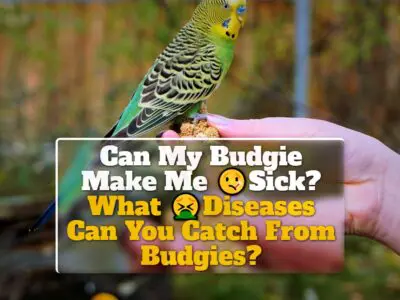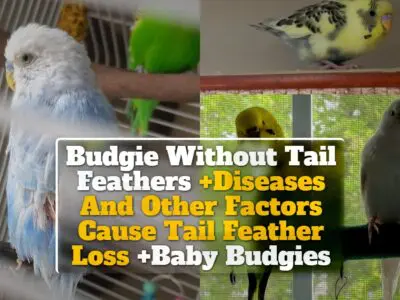Handling budgies requires patience, trust-building, and gentle interaction.
Budgies, as a rule, do not prefer to be grabbed, as it can cause them stress and possible injury.
Regular, careful handling can enhance the budgie-human bond and contribute to their overall well-being.
However, improper handling may lead to health issues such as stress, feather damage, and even disease transmission.
Leaning on my past experience as a budgie owner myself, I want to guide you on the journey of handling budgies safely and comfortably.
We’re going to explore everything – from the training phase to understanding the possible risks.
How To Handle Budgies? Long-Term Training
Handling budgies is a long-term commitment and it involves more than just physical interaction.
The trust-building process is a key aspect of handling these delicate creatures.
Budgies are social, intelligent, and emotional creatures.
They are not objects to be manhandled, but beings to be nurtured and trained with patience and gentleness.
Training Budgies To Get Used To Being Handled
Getting budgies to accept human handling requires a series of gradual steps which you should always undertake in a calm and patient manner.
Training isn’t about domination or control, but rather about understanding and mutual respect.
Give Them Time To Adjust
The first step to handling a budgie is giving them time to adjust to their new surroundings.
This period allows your budgie to familiarize itself with its environment, cage, and the sights and sounds of your home.
A budgie might need anything from a few days to a week to comfortably adjust.
During this time, refrain from any attempts to handle your budgie.
Build Trust (Use Treats, Your Voice, Gentle Touches)
Building trust with your budgie is a key factor in establishing a strong and positive relationship.
Use treats as a tool to make positive associations with your presence.
Softly talking to your budgie allows it to get used to your voice, and gentle touches can help reinforce this positive relationship.
Remember to approach your budgie calmly, never forcing interaction.
Open The Cage Door
Once your budgie is comfortable with your presence, the next step is to open the cage door, giving your budgie the freedom to explore outside its cage.
It’s critical to ensure that the room is secure and free from potential dangers before taking this step.
Train With Perches
Training with perches can be a great way to get your budgie used to the concept of stepping onto your hand.
Initially, use a perch instead of your hand and encourage your budgie to step onto it.
This is an important intermediate step before introducing your hand into the equation.
Hand Training
Hand training your budgie is a delicate process that requires patience.
It involves gradually introducing your hand into the cage, being mindful to avoid sudden movements that might scare your budgie.
Consistency and patience are vital during this stage of the training.
Step-Up Training
The next phase is “step-up” training.
This involves teaching your budgie to step onto your finger when prompted.
Always reward your budgie with a treat or gentle petting when it steps onto your finger.
This positive reinforcement encourages your budgie to continue this behavior.
Handling (Being Grabbed)
After your budgie is comfortable with step-up training, you can slowly progress to handling your budgie.
Remember, gentle and calm handling is crucial at all times.
Your aim is to make your budgie comfortable with your touch, not to restrict its movement.
Be Consistent
Throughout this process, consistency is the key.
Training a budgie to be comfortable with handling isn’t an overnight process.
It requires daily interactions and patience.
Always make sure to spend time with your budgie, and remember to reinforce positive behavior consistently.
Over time, your budgie will learn to trust you and accept your handling, leading to a more enriched and positive pet-owner relationship.
How To Grab Any Budgie?
While it is always preferable to have a well-trained budgie who is comfortable being handled, sometimes situations might necessitate picking up or grabbing your budgie.
Such situations should always be undertaken with the utmost care and gentleness, with the budgie’s comfort and wellbeing at the forefront.
Prepare The Environment
Before you even approach your budgie, you need to prepare the environment.
Ensure the room is secure, with doors and windows closed, and hazards such as other pets removed.
This can minimize risk in case your budgie gets frightened and tries to fly away.
Approach Slowly
Always approach your budgie slowly.
Rapid movements can scare a budgie and cause it to become defensive or attempt to fly away.
By moving slowly, you signal that you are not a threat, and this can help your budgie remain calm.
Open The Cage
When you are ready to grab your budgie, slowly and calmly open the cage door.
Avoid sudden movements that might startle your budgie.
Reach In Slowly
Once the cage door is open, you can begin to reach in slowly.
This approach should be as calm and composed as possible.
Swift movements can stress your budgie, making it more difficult to hold.
Gentle Grasp
When you are ready to hold your budgie, use a gentle but firm grasp.
You want to be firm enough to hold your budgie, but gentle enough not to hurt or scare it.
Always remember to never squeeze your budgie.
Hold The Budgie
Once you have your budgie in your hand, hold it gently.
Your thumb should be on one side of its body, and your index finger on the other.
The budgie’s head should be gently tucked between your index and middle fingers.
This safe and secure hold will keep the budgie calm while also preventing it from injuring itself by flapping its wings.
Remember, grabbing a budgie should be a last resort, reserved for situations where it’s necessary for the bird’s safety or health.
In general, it’s best to work on trust-building exercises and training to ensure your budgie is comfortable with handling.
How Does A Veterinarian Hold A Budgie?
A veterinarian will typically hold a budgie in a similar manner to how an owner might, but with added professional precision and care to prevent injury and stress.
The vet would gently but firmly encircle the budgie’s body with their fingers, allowing the bird’s head to rest between their index and middle finger.
This hold ensures the bird is secure but still comfortable. However, some veterinarians have different methods of handling birds.
Is It Ok To Grab My Budgie? What Should Be Considered When Handling (Grabbing) A Budgie?
Ideally, your budgie should be comfortable being handled and stepping onto your finger on command.
However, there might be instances when you need to physically hold or grab your budgie.
This should always be done with care and patience to avoid causing stress or injury.
First, consider the budgie’s comfort level with you.
If your budgie isn’t used to being held, it may be frightened and react defensively.
Next, always use a gentle grip that’s firm enough to secure the bird but not so tight as to cause harm.
Finally, be aware of the budgie’s reactions.
If it appears stressed or anxious, give it space and try again later.
How Long Can We Hold The Budgies?
Budgies can be held for short periods of time, but it’s important to pay attention to their body language.
If the budgie seems distressed, uncomfortable, or attempts to fly away, it’s time to let it go.
Typically, 1 to 3 minutes of handling at a time is a good guideline.
How Often Can We Hold Budgies In Our Hands?
The frequency of holding your budgie can vary depending on the bird’s comfort level.
If your budgie is comfortable with you, you might be able to hold it daily.
What Are The Diseases And Negative Consequences Caused By Handling (Grabbing) Budgies?
While handling your budgie improperly or too often won’t directly cause disease, it can lead to stress, which can weaken the bird’s immune system, making it more susceptible to illness.
Stress from improper handling can also lead to behavior changes such as biting or feather plucking.
Physical injury can also occur from improper handling.
A budgie’s bones are incredibly delicate, and rough handling can lead to fractures.
Additionally, if a budgie is grabbed around the chest, it can cause difficulty breathing, as birds need to be able to move their chest freely to breathe properly.
Always handle your budgie with the utmost care, and remember that your actions can greatly impact their physical and mental health.
Stress
Stress in budgies can occur from various sources, one of which is improper or excessive handling.
When budgies are stressed, they may exhibit various symptoms such as loss of appetite, lethargy, aggression, or changes in droppings.
Chronic stress can lead to a weakened immune system, making budgies more susceptible to disease.
It is crucial to observe your budgie’s behavior and ensure that your handling practices are not causing undue stress.
Injuries
Injuries from handling can occur if the budgie is held too tightly or if it struggles and injures itself in the process.
Budgies have fragile bones and can easily sustain fractures or dislocations if handled roughly.
Additionally, improper handling can lead to soft tissue damage, which may not be immediately visible but can cause long-term health problems.
Feather Damage
Improper handling can result in feather damage, which can affect a budgie’s ability to fly and regulate its body temperature.
Rough handling can cause feathers to break or be pulled out, which can be painful for the bird.
In severe cases, repeated feather damage can result in a condition called feather plucking, where a bird self-mutilates its feathers out of stress.
Bumblefoot
While not directly related to handling, Bumblefoot (pododermatitis) is a common condition in budgies that can be exacerbated by stress.
Bumblefoot is a bacterial infection and inflammatory reaction on the feet and legs of birds, often linked to poor hygiene or abrasive perches.
Stress from improper handling can lower a budgie’s immune response, making it more susceptible to conditions like Bumblefoot.
Psittacosis
Psittacosis, also known as parrot fever, is a bacterial infection that can be transmitted from birds to humans.
Budgies can be carriers of this disease.
If a person with a weak immune system handles a budgie with Psittacosis, they risk contracting the disease.
While not directly caused by handling, understanding zoonotic diseases like Psittacosis is important for any budgie owner.
Emotional Trauma
Budgies are intelligent and sensitive creatures, and traumatic experiences can have lasting emotional effects.
If a budgie is frequently handled roughly or without consideration for its comfort and safety, it can develop fear and anxiety.
This can manifest as aggressive or defensive behaviors and can harm the bond between the budgie and its owner.
It’s crucial to always handle budgies gently and patiently, to foster trust and build a positive relationship.
What Are The Downsides Of Handling A Budgie For Humans (Children And Adults)?
Handling budgies offers a rewarding experience, helping to establish a deep bond between the bird and its owner.
However, it does come with certain risks and challenges.
It’s crucial for both adults and children to understand these to ensure the best possible interaction with the bird.
Risk Of Bites
Budgies, especially if frightened or agitated, may bite as a defense mechanism.
These bites, although small, can be surprisingly painful and may cause slight swelling or redness.
It’s important for handlers, particularly children, to understand the potential for bites and to handle the bird calmly and gently to avoid causing stress or fear.
Allergic Reactions
Some people may be allergic to birds or bird dander.
Symptoms of an allergic reaction can include sneezing, itchy eyes, and rashes.
These symptoms may be more severe for people with asthma or other respiratory conditions.
If you or anyone in your household has allergies, it’s crucial to consider this before deciding to own and handle a budgie.
Disease Transmission
Although rare, certain diseases can be transmitted from birds to humans (zoonotic diseases), such as Psittacosis.
Proper hygiene, including washing hands before and after handling the bird and regular vet check-ups for the budgie, can help mitigate this risk.
Scratches
Budgies have sharp claws that can cause scratches when they perch on your hand or arm.
While these scratches are usually minor, they can be uncomfortable and, in some cases, lead to infection if not properly cleaned and cared for.
FAQs
These are some commonly asked questions about handling budgies.
Remember that every budgie is unique and may react differently to being handled.
Do Budgies Like To Be Grabbed?
Generally, budgies do not like to be grabbed.
Budgies are small, delicate creatures who value their personal space and freedom to move around.
Grabbing can be very stressful for them and may even cause physical harm if done improperly.
It’s recommended to train your budgie to step onto your hand or a perch voluntarily instead.
Over time, with proper trust-building exercises and training, your budgie may tolerate or even enjoy being held, but this should always be done gently and with their comfort in mind.
Do Budgies Need Physical Touch?
While budgies may not require physical touch like some pets (dogs or cats, for example), they do benefit from social interaction, which can include a form of gentle handling.
Regular interaction with humans can enrich their lives, providing mental stimulation and creating a strong bond between you and your budgie.
Can Improper Handling Of Budgies Lead To Serious Health Conditions?
Yes, improper handling of budgies can potentially lead to serious health conditions.
Physical injuries from rough handling, stress-related illnesses due to fear, and feather damage from excessive handling are some of the issues that may arise.
In extreme cases, zoonotic diseases such as Psittacosis can be transmitted to humans, though this is rare.
Is Regular Hand-Contact Necessary For A Budgie’s Health And Well-being?
While budgies can benefit from regular, gentle interaction with their human caretakers, it’s not strictly necessary for their physical health.
However, it can significantly contribute to their emotional well-being.
Providing them with a varied, stimulating environment, good nutrition, and occasional safe outings from their cage can keep a budgie happy and healthy.
Sources:



